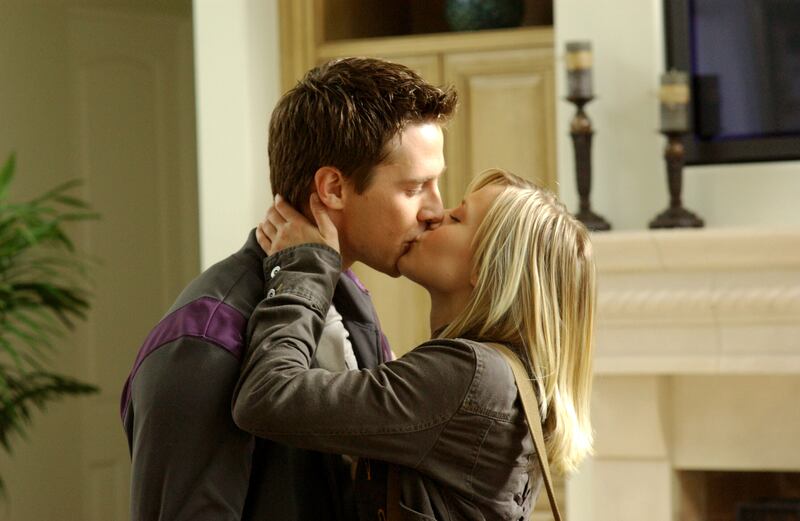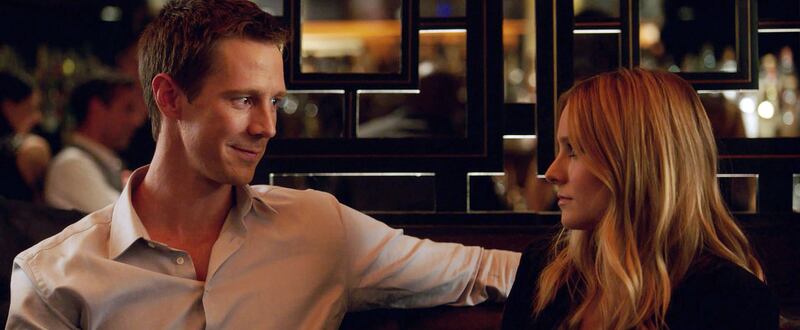Note: The following contains spoilers for the ending of Veronica Mars season four.
Season four of Veronica Mars ends with a body blow of a twist: There are two men in the titular private detective’s life who mean everything to the character immortalized by Kristen Bell, and thanks to a mad bomber, one of them is killed.
If that man had been Keith Mars (Enrico Colantoni), her beloved father and mentor, it would have been heart-wrenching but arguably not a total game-changer for the show, as Veronica has long been groomed to follow in his footsteps. Instead, after a season of Veronica and long-time flame Logan Echolls (Jason Dohring) together but coping with some serious relationship issues, the final moments of the season finale, “Years, Continents, Bloodshed,” bade farewell to Logan thanks to a car bomb Veronica figured out moments too late was targeted for her.
Killing off Logan isn’t just a brutal moment for a specific subset of the show’s fanbase, whose adoration for the couple known as #LoVe has been transformed into rage (just check out Twitter for the proof), but a plot choice that reflects the show’s uncertainty about where its strengths lie.
The first season of Veronica Mars is, at least in this humble writer’s opinion, one of television’s greatest achievements, especially given that it was made in the era of 22-episode seasons, under the umbrella of broadcast-level standards and practices. (In the new season, a nod is made to adhering at least somewhat to those days, with Veronica and Keith avoiding F-bombs by instead saying “cussing.”) It’s a stellar mix of genres that also builds up a tight and haunting series of mysteries—and it’s also busy setting up what becomes the show’s central love story: Veronica, social outcast from the lower middle class, and Logan, rich thanks to his movie star father Aaron, but deeply damaged thanks to Aaron’s abuse.

Logan is initially introduced as a bad little rich boy, breaking Veronica’s headlights in the pilot and shunning her otherwise. But over the course of Season 1, he and Veronica grow closer, eventually culminating in one of TV’s most epic kisses after Logan finds himself protecting her from a potential threat—it’s legitimately a kiss for the ages, and the band Something Happens hopefully racked up a pretty penny in iTunes and other digital services sales for their signature track, which still invokes the memory of that singular moment.
But the problem with having a really great first season, especially one which brings together two characters whose unlikely connection made them all the more compelling, is that you have to keep going without losing sight of what made the show compelling in the first place. Veronica Mars made an effort, but the off-and-on-again nature of Veronica and Logan’s romance became so hard to keep plausible by the end that yes, it made sense for Season 3 to end with Veronica in a less thrilling, but stable relationship with the always reliable Piz (Chris Lowell).
Piz, though, never felt like a real final destination for Veronica—or, as it might be defined elsewhere, “endgame.” The concept of “endgame” when it comes to the sort of will-they-won’t-they relationships that, in a post-X-Files era, are standard practice to include in a TV show’s basic framework, is at times a lot to consider. After all, to declare a relationship “endgame” is to imply that the story is over once the characters get together, which has a way of implying that the most interesting part of a relationship story is the prelude to the hook-up.
That’s not how real life works, or more importantly good TV, so it was hardly a surprise when the crowdfunded feature film made fan service, including reuniting Veronica and Logan, its priority, returning the series to what had always been its most crowd-pleasing element. But what the film overlooked, and the fourth season struggled to explore, was the fact that Logan was always at his most interesting when his damage was on display; a fact that never led to healthy behavior on Veronica’s part.

It’s something which the new season did attempt to address, in a sequence in which Logan, to use his term, “Hulks out,” shedding his veneer of well-adjusted therapy-attending good boy so that he and Veronica can have even hotter sex than usual. But it’s not a permanent change, and Veronica’s restlessness with him doesn’t go away, which is perhaps why, when Logan leaves town, Veronica has a pretty hot dream about Leo (Max Greenfield), a pre-Logan flame of Veronica’s whose appearance in season four feels like a prelude to a future return. Veronica and Leo always had a rapport, but their relationship was never, to quote Logan in season two, “epic”—thus, the implication that she might find herself with him down the line, after theoretically grieving for Logan, is a jarring one.
Killing off Logan in some sense feels like clearing away baggage that was weighing down the series, but it still leaves the question of how Veronica Mars moves on without a defining aspect of the series—while it’s a bold choice, it leaves the viewer fundamentally questioning why they might want to continue watching the show, especially given that the core mystery of the season was lackluster. (Patton Oswalt has many talents, but depicting an evil genius, at least in this case, is not one of them.) If Veronica Mars isn’t a good mystery show, and it isn’t a romance, then what is it?
Should Veronica Mars continue, it needs to answer that question, and redefine what it is, now that it can no longer lean on the romance with Logan to keep fan interest. Perhaps the best solution is to let Veronica stand on her own, and maybe even pursue some female friendships—never one of the show’s strong suits, beyond her bond with hacker girl Mac that creator Rob Thomas deemed non-essential to continue in season four (even telling actor Tina Majorino that if he brought her character back, she wouldn't have her own storyline). Whatever the choice, the show faces a problem similar to what happens to anyone, when a relationship ends—figuring out who you are without it.

